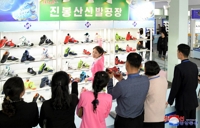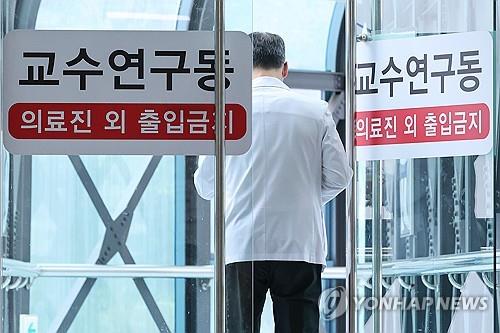(2nd LD) New cases hit record high of over 380,000; COVID-19 death toll tops 10,000
(ATTN: ADDS latest info in para 8)
SEOUL, March 12 (Yonhap) -- South Korea's daily coronavirus cases hit another record high of over 380,000 on Saturday amid the omicron surge, with the death toll surpassing 10,000.
The country reported 383,665 new COVID-19 infections, including 383,590 local cases, raising the total caseload to 6,206,277, according to the Korea Disease Control and Prevention Agency (KDCA).
It marks the largest-ever daily count, surpassing the previous daily high of 342,446 cases tallied Wednesday.
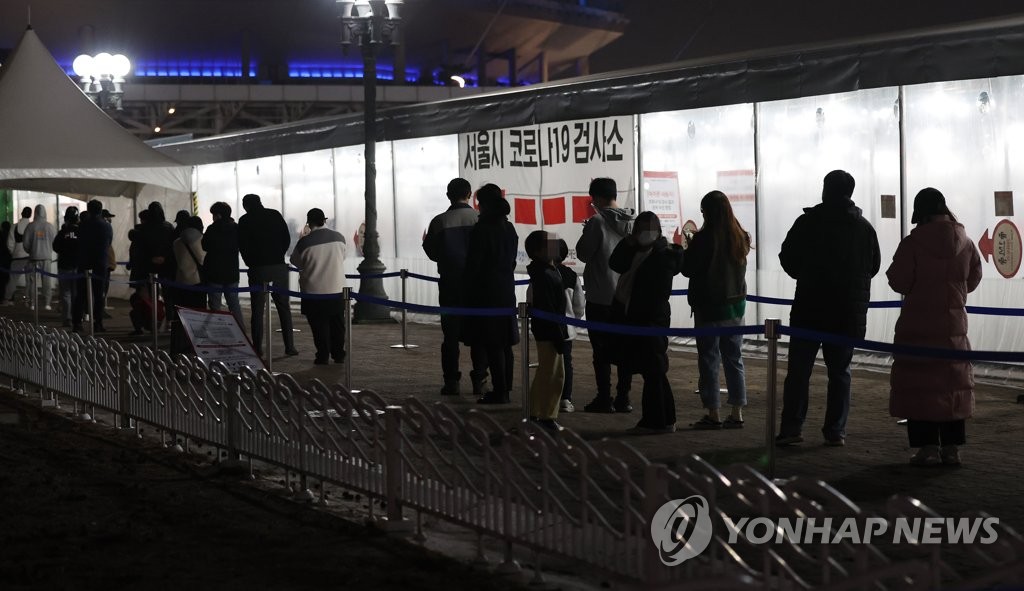
People wait in line to receive tests at a COVID-19 testing station in western Seoul on March 11, 2022. (Yonhap)
Total cases also reached 6 million Saturday, rising from 5 million in only three days.
The more transmissible omicron variant-fueled surge in infections has led to more COVID-19 deaths, and severe and critical virus cases.
The country confirmed 269 more COVID-19 deaths, breaking the previous record of 229 set Friday. The accumulated deaths came to 10,144, and the fatality rate was 0.16 percent.
Severe and critical virus cases came to 1,066, down 50 from the previous day. The tally's record high was 1,151 cases on Dec. 29.
As of 6 p.m. Saturday, the country had reported 296,065 more cases, down 2,601 from the same time the previous day, according to health authorities and provincial governments. Daily cases are counted until midnight and announced the following morning.
The health authorities earlier said the country is expected to experience the peak of the pandemic in the coming week.
The government is also planning to revise the current treatment system for COVID-19 patients to better use scarce medical resources.
Starting next week, virus patients hospitalized with minor symptoms will be able to receive treatment at general hospital wards.
Results from rapid antigen tests conducted by medical institutions also will be accepted in officially confirming COVID-19 infections.
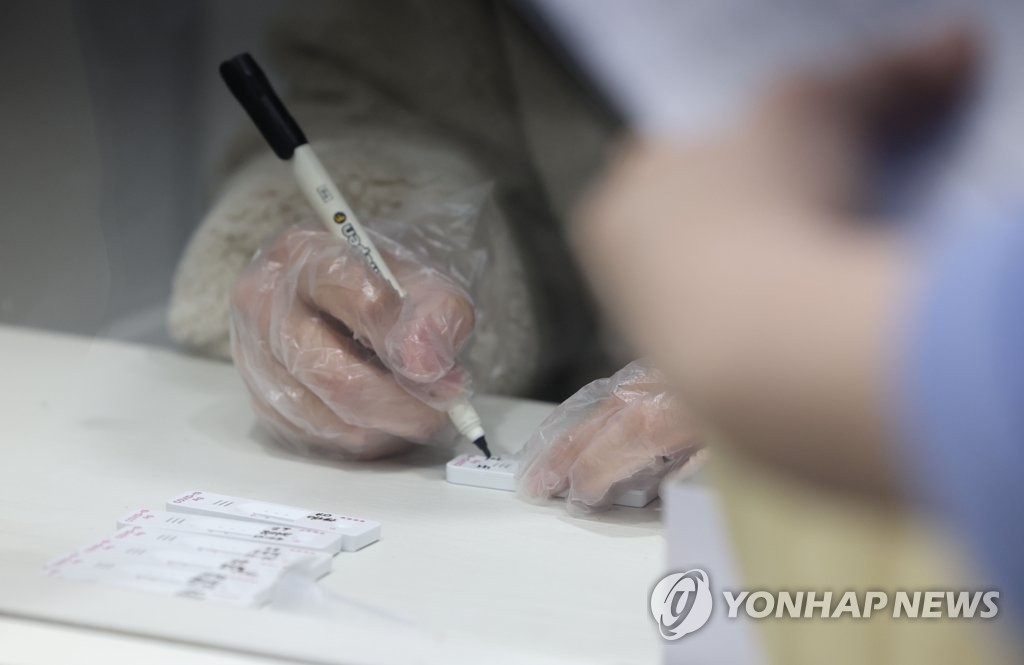
A medical official conducts a COVID-19 test, using a rapid antigen test kit, at a hospital in Seoul on March 11, 2022. (Yonhap)
Also starting March 21, fully vaccinated South Koreans and foreign visitors from overseas do not need to self-quarantine, except for those from Pakistan, Uzbekistan, Ukraine and Myanmar.
Currently all people who enter South Korea should self-quarantine for seven days regardless of their vaccine status.
Beginning in April, foreign visitors and South Koreans who return home from overseas trips will be allowed to take public transportation from the airport to their destinations. Currently, only private cars and "quarantine taxis" are permitted as a means of transportation.
Those measures are part of the Seoul government's move to relax its antivirus regulations and deal with the unrelenting omicron surge.
It has shifted its focus to preventing deaths and using medical resources to treat more serious cases by ramping up the use of rapid antigen self-test kits and at-home treatment, scrapping its rigorous contact tracing program.
The government eased social distancing curbs, such as nighttime curfews, last week to help struggling small businesses. Cafes and restaurants, among others, are now allowed to stay open until 11 p.m.
Of the locally transmitted cases reported Saturday, Seoul reported 80,437 new cases. The surrounding Gyeonggi Province and the western city of Incheon added 107,943 and 23,738 new infections, respectively. Cases from overseas went up 76 to 30,206.
As of midnight, 32.06 million people, or 62.5 percent of the country's 52 million population, had received booster shots. The number of fully vaccinated people came to 44.4 million, accounting for 86.5 percent.
COVID-19 patients who were under at-home treatment rose 342,199 to 1.43 million, according to the KDCA.
brk@yna.co.kr
(END)
-
 S. Korea marks 30th anniv. of Korean Pavilion at Venice Biennale with contemporary art
S. Korea marks 30th anniv. of Korean Pavilion at Venice Biennale with contemporary art -
 Artist Lee Bae captures ethereal Korean aesthetics at Venice Biennale
Artist Lee Bae captures ethereal Korean aesthetics at Venice Biennale -
 Ateez member Yunho throws first pitch at MLB match between Dodgers, Mets
Ateez member Yunho throws first pitch at MLB match between Dodgers, Mets -
 Gov't likely to accept university chiefs' request to lower med school enrollment quota
Gov't likely to accept university chiefs' request to lower med school enrollment quota -
 S. Korea supports resolution backing U.N. membership of Palestine
S. Korea supports resolution backing U.N. membership of Palestine
-
 Artist Lee Bae captures ethereal Korean aesthetics at Venice Biennale
Artist Lee Bae captures ethereal Korean aesthetics at Venice Biennale -
 S. Korea marks 30th anniv. of Korean Pavilion at Venice Biennale with contemporary art
S. Korea marks 30th anniv. of Korean Pavilion at Venice Biennale with contemporary art -
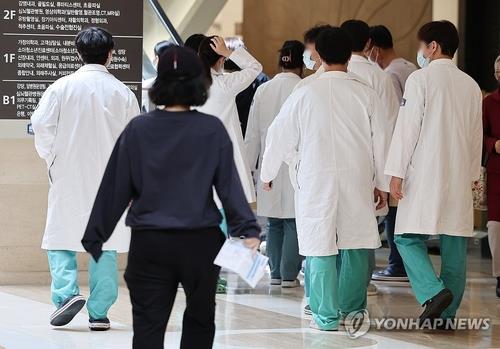 Gov't likely to accept university chiefs' request to lower med school enrollment quota
Gov't likely to accept university chiefs' request to lower med school enrollment quota -
 Experts see possibility of N.K. conducting nuclear test before U.S. presidential vote
Experts see possibility of N.K. conducting nuclear test before U.S. presidential vote -
 Details of meeting between Yoon, opposition leader undecided: presidential office
Details of meeting between Yoon, opposition leader undecided: presidential office
-
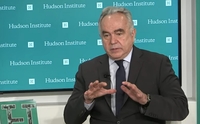 U.S. will take steps for three-way engagement on nuclear deterrence with S. Korea, Japan: Campbell
U.S. will take steps for three-way engagement on nuclear deterrence with S. Korea, Japan: Campbell -
 (LEAD) Hybe to file complaint against sublabel executives over internal conflict
(LEAD) Hybe to file complaint against sublabel executives over internal conflict -
 S. Korea reports highest suicide rate, ultra fine dust level among OECD nations: data
S. Korea reports highest suicide rate, ultra fine dust level among OECD nations: data -
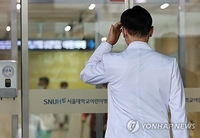 Looming weekly closure of major hospitals feared to worsen medical service crisis
Looming weekly closure of major hospitals feared to worsen medical service crisis -
 U.S. sent ATACMS missiles to Ukraine following Russia's use of N.K. missiles: White House
U.S. sent ATACMS missiles to Ukraine following Russia's use of N.K. missiles: White House















